Customer Service Lines Open Mon-Fri 9am-6pm
Closed Saturday & Sunday & Bank Holidays



Need Help? Calling from a mobile please call 0151 647 7556
0800 195 4926Do you have a question? or need help?
Customer Service Lines Open Mon-Fri 9am-6pm ,
Confused by Gap Insurance? How does it work? Where can you buy Gap Insurance? What does it do? Do I need it? Over the years, the experts at GapInsurance123 have been asked all kinds of queries on Gap Insurance, and we have compiled what we think may be the most comprehensive guide on the subject available today.
What is more, we offer this ultimate guide free of charge for you. We hope you find the answers you are looking for, but if not, please contact us, and we will do our best to help. Of course, we will be adding to the list of questions over time, and if you have any suggestions that you think we could add then, please feel free to let us know.
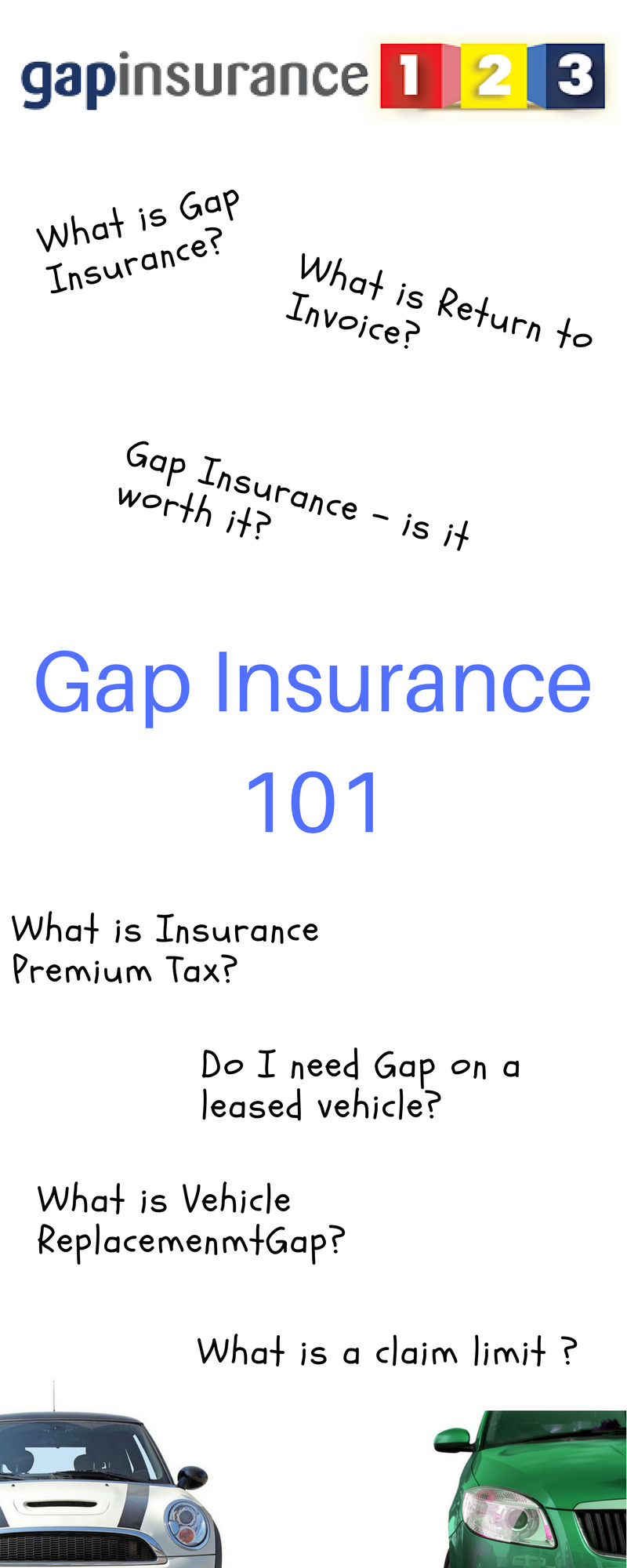
1 . What is Gap Insurance?
2. Why buy Gap Insurance?
3. How does Gap Insurance work?
4. What are the different types of Gap Insurance?
5. When do you need to buy Gap Insurance?
6. Is there tax on Gap Insurance?
7. Do you have to buy Gap Insurance at all?
8. Do you have to buy Gap Insurance from the motor dealer?
9. What does 'Gap' stand for in Gap Insurance?
10. What other names can Gap Insurance be known as?
11. Can Gap Insurance be confused with other types of insurance?
12. What does Gap Insurance not cover?
13. Is it worth getting Gap Insurance on a new car?
14. If you have 'new for old' then is there no need for Gap Insurance then?
15. Is Gap Insurance value for money?
16. How much should I be paying for Gap Insurance?
17. Is Gap Insurance transferable?
18. Does Gap Insurance cover all drivers?
19. Who is actually covering me with Gap Insurance?
20. Am I protected if my Gap Insurance company fails?
Gap Insurance, also known as Guaranteed Asset Protection, Asset Protection is a type of insurance that protects a form of financial loss in the event of a motor vehicle being declared a 'total loss' by a motor insurer. This may be following an accident, fire, theft, flood, etc, where the motor insurer 'writes off' the vehicle as a total loss, and agrees to pay the insured the market value of the vehicle at that time.
This issue with this 'market value' settlement is that it could represent a figure far lower than the insured first paid for the vehicle. This is where Gap Insurance can step in by covering an element of the financial loss suffered when the vehicle was declared a total loss.
Back to Menu
 Q: Why buy Gap Insurance?
Q: Why buy Gap Insurance?
The consideration for Gap Insurance really comes from two factors. Firstly nearly every single motor vehicle you may purchase will lose value over time. The second factor is that your vehicle may become involved in an incident that could lead your vehicle to be deemed a 'total loss' by your motor insurer. This may be after an accident, theft, fire, flood, etc.
This combination of events may see your motor insurer making a 'market value' settlement for the vehicle to you, and this figure may be far less than you originally paid for the vehicle, or what you may still owe on finance. The Gap Insurance is designed to cover an element of your financial loss in this event.
Back to Menu
For Gap Insurance to work, then you must have a motor insurance policy covering the vehicle in question. If the vehicle suffers an incident that leads the motor insurer to declare it a total loss and pays you the market value, then you can then claim on the Gap Insurance for an element of the depreciation the vehicle has suffered. What exactly you can claim for depend's of which type of Gap Insurance you have, and we will explain that later in detail.
So in short, you must normally have a comprehensive motor insurance policy in place for your Gap Insurance to be valid. If you do not have comprehensive cover then in many cases you cannot then claim on Gap Insurance for any loss.
That is easy, if the motor insurer returns the vehicle to you repaired, then you simply have not suffered a loss due to write off. There would be no 'Gap' to claim.
Back to Menu
If you have been offered Gap Insurance by the dealer, then that normally is just one type. You may be forgiven for thinking that that is the only option for Gap Insurance, but you would be wrong. There are several types of Gap cover protection, here is a basic explanation on each.
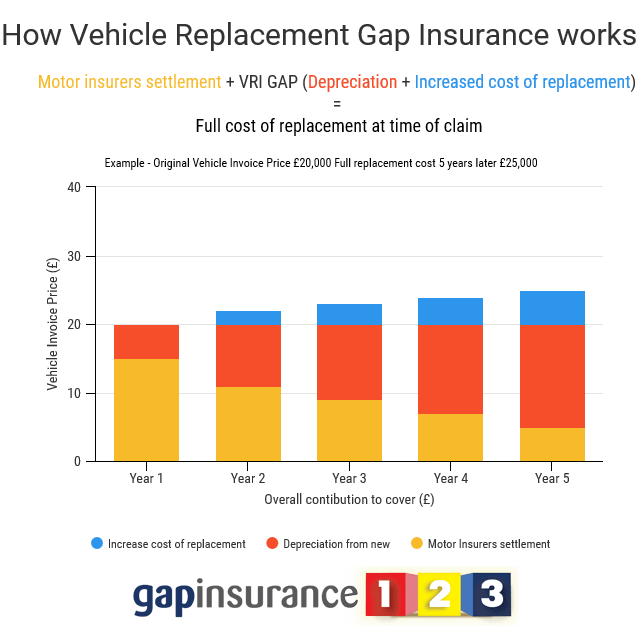
If you make the decision that you want to buy Gap Insurance, then you normally have to do this within a timeframe of collecting your vehicle. This window to purchase can differ from policy to policy and insurer to insurer. Let's give you some comparisons between our GapInsurance123 website and our sister website's at Totallossgap, Shortfall.co.uk and at Easy Gap.
Finance and Contract Hire Gap
GapInsurance123 - unlimited period
Easy Gap - unlimited period
Shortfall.co.uk - 180 days from vehicle purchase
Totallossgap.co.uk - 365 days from vehicle purchase (new cars with 'new for old' with the motor insurance. 180 days used cars)
Combined Return to Invoice Gap
GapInsurance123 - 180 days from vehicle purchase
Easy Gap - 105 days from vehicle purchase
Shortfall.co.uk - 180 days from vehicle purchase
Totallossgap.co.uk - 365 days from vehicle purchase (new cars with 'new for old' with the motor insurance. 180 days used cars)
Combined Vehicle Replacement Gap
GapInsurance123 - 180 days from vehicle purchase
Easy Gap - 105 days from vehicle purchase
Shortfall.co.uk - 180 days from vehicle purchase
Totallossgap.co.uk - 365 days from vehicle purchase (new cars with 'new for old' with the motor insurance. 180 days used cars)
It may well be the case that these periods could be much sooner if you are considering buy the Gap Insurance from the motor dealer, where the window may be 30-90 days from vehicle purchase.
Once you are outside the permitted purchase period for the policy, you may still qualify for an Agreed Value Gap, but this is likely to offer less cover than Invoice or replacement protection indeed.
Back to Menu
Yes, while insurance products are not subject to VAT they are subject to Insurance Premium Tax on every sale. When you buy Gap Insurance from the company who is involved in the sale of the motor vehicle to you, i.e., the motor dealer, then the premium is subject to the higher rate of IPT at 20%. When you buy the Gap Insurance from an independent provider, like GapInsurance123, then the sale of this insurance is subject to the standard rate of IPT at 10%.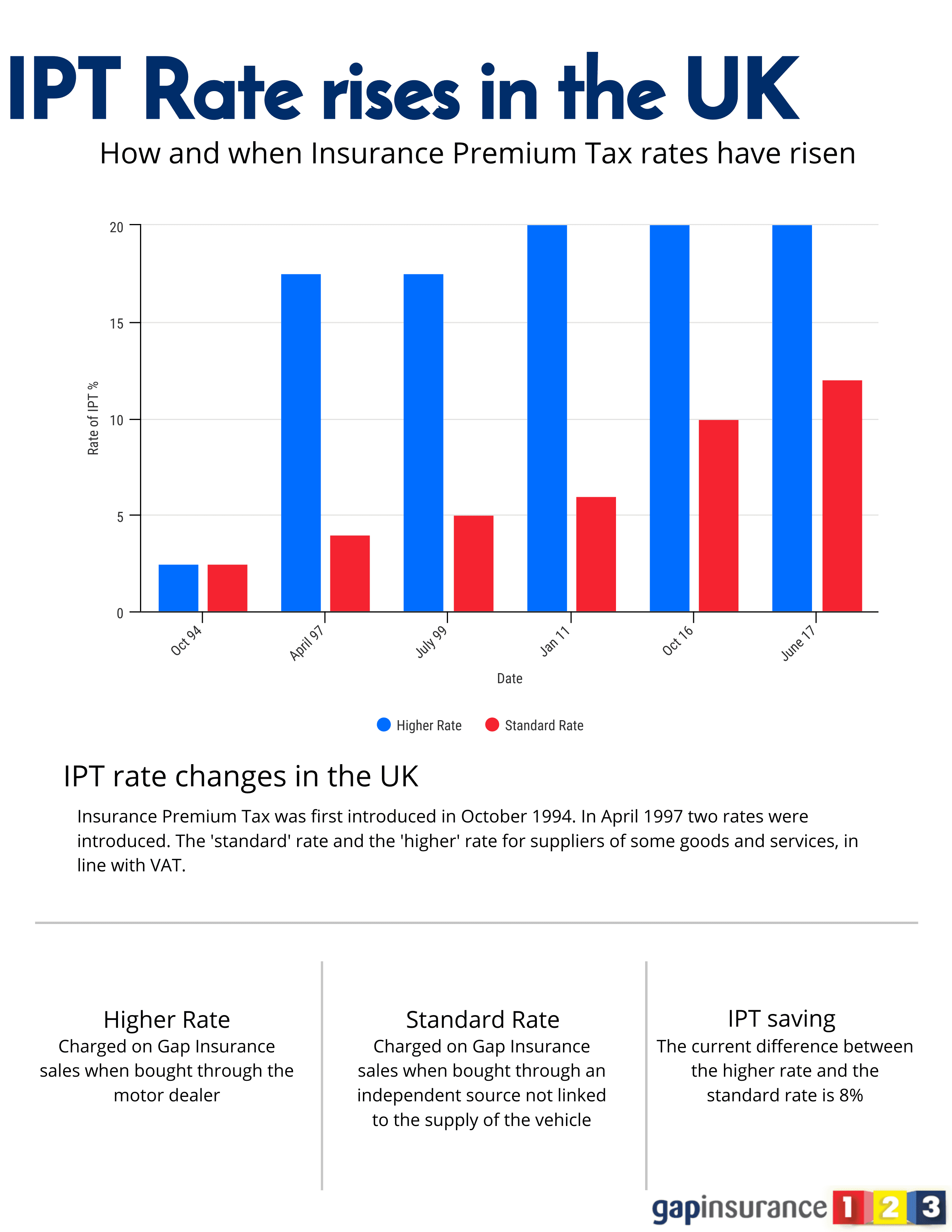
The standard rate of Insurance Premium Tax was raised from 6% to 9.5% in 2015, and again to 10% on 1st October 2016.
It was announced in the Autumn statement from the new Chancellor Philip Hammond that Insurance Premium Tax was to rise again to 12% from June 2017.
Back to Menu
The short answer is simply no. Gap Insurance is not a legal requirement, and therefore cannot be imposed on any person buying a vehicle in the UK. This is why you should be offered Gap Insurance separately from the deal you sign for when purchasing the vehicle. The new FCA rules brought in on 1st September 2015 hopefully will ensure that is the case these days.
On the basis that nearly all vehicles will lose value, and your motor insurer generally only covers you for the market value at the point of loss, then we feel Gap Insurance provides valuable 'peace of mind' cover for many motorists. But no everyone would share that view.
Gap Insurance, is it worth it? That is just a decision you have to make for your particular circumstance.
Back to Menu
Well, some motor dealers might like you think that way, but again the answer is clearly no. Again the new FCA rules in 2015 were designed to break the motor dealers 'point of sale' advantage and enable consumers to consider all providers in the market.
The idea now is that your motor dealer must provide, after presenting you with their Gap Insurance proposal, a period of time for you to consider your options in the Gap Insurance market, information that the policy is not mandatory and that you can buy it elsewhere.
The FCA were clear that they felt the previous position that motor dealers held was not conducive for real competition in the market. The new rules, it is hoped, will go some way to solve that problem.
It is often assumed that the product is called 'Gap' because is fills the gap between the motor insurer's settlement and the amount you have insured. However, this is not the case. 'GAP' stands for Guaranteed Asset Protection.
Back to Menu
This is an area that can cause some confusion as some insurers can call their versions of Gap Insurance by a different name. Some examples of this could include:
There can also be some confusion with slightly different names for the various types of Gap Insurance also. Examples of this could be:
Yes, there is a common type of 'Gap' insurance used for Gap Year students who are on holiday. Clearly, that is something entirely different. Another common misunderstanding is where some think Gap Insurance is something you take for a short term use of a motor vehicle. Another example could be a 'Gap' Insurance is to cover a 'gap' between a firm's Professional Indemnity Insurance payout and what claim a client may make.
All of these are often confused with the Gap Insurance we provide against financial losses suffered as a result of a vehicle becoming a total loss.
Back to Menu
This question really depends on the policy and the provider. However, some general area's where Gap Insurance does not cover you could be:
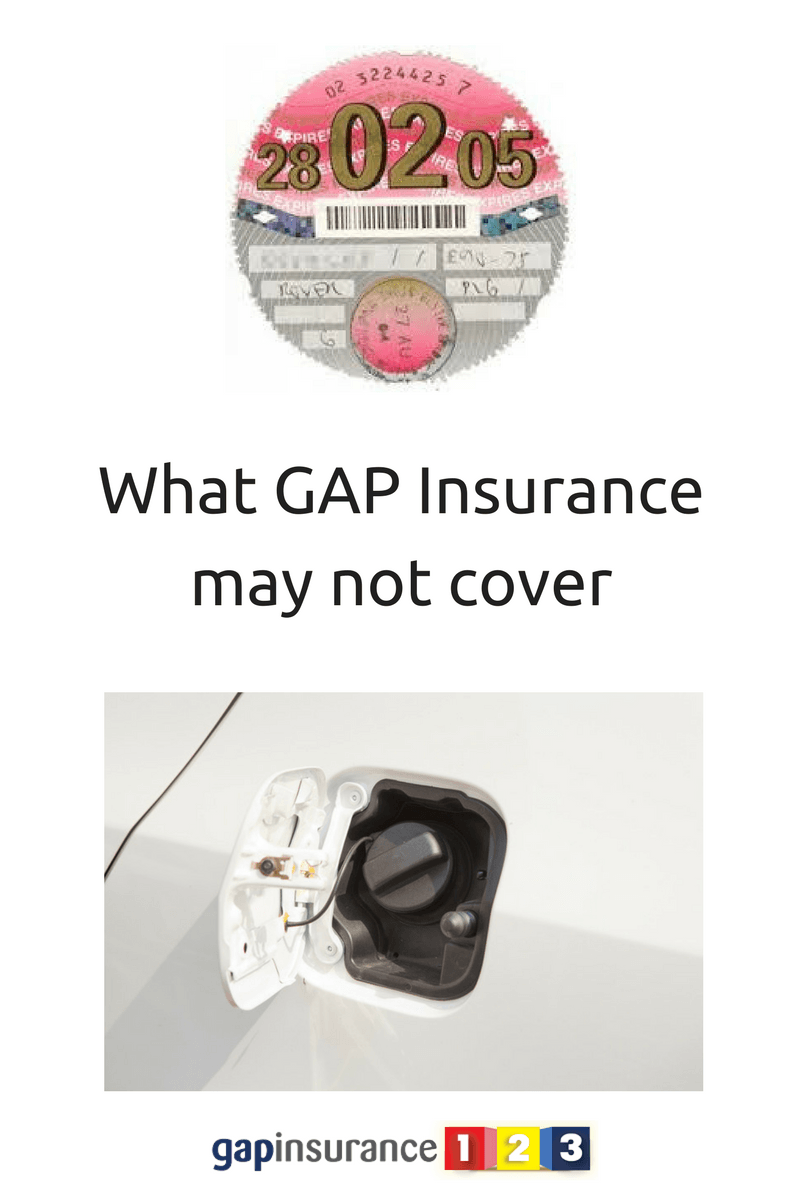
There are several factors to consider when buying Gap Insurance for a new car. New cars are an expensive item, and you may expect that the value of a new car will depreciate at its quickest rate in the first few years of its life. Should the vehicle be written off then, you could expect to potentially lose thousands of pounds in that event.
That is a good argument to consider Gap Insurance, but there are other aspects to consider.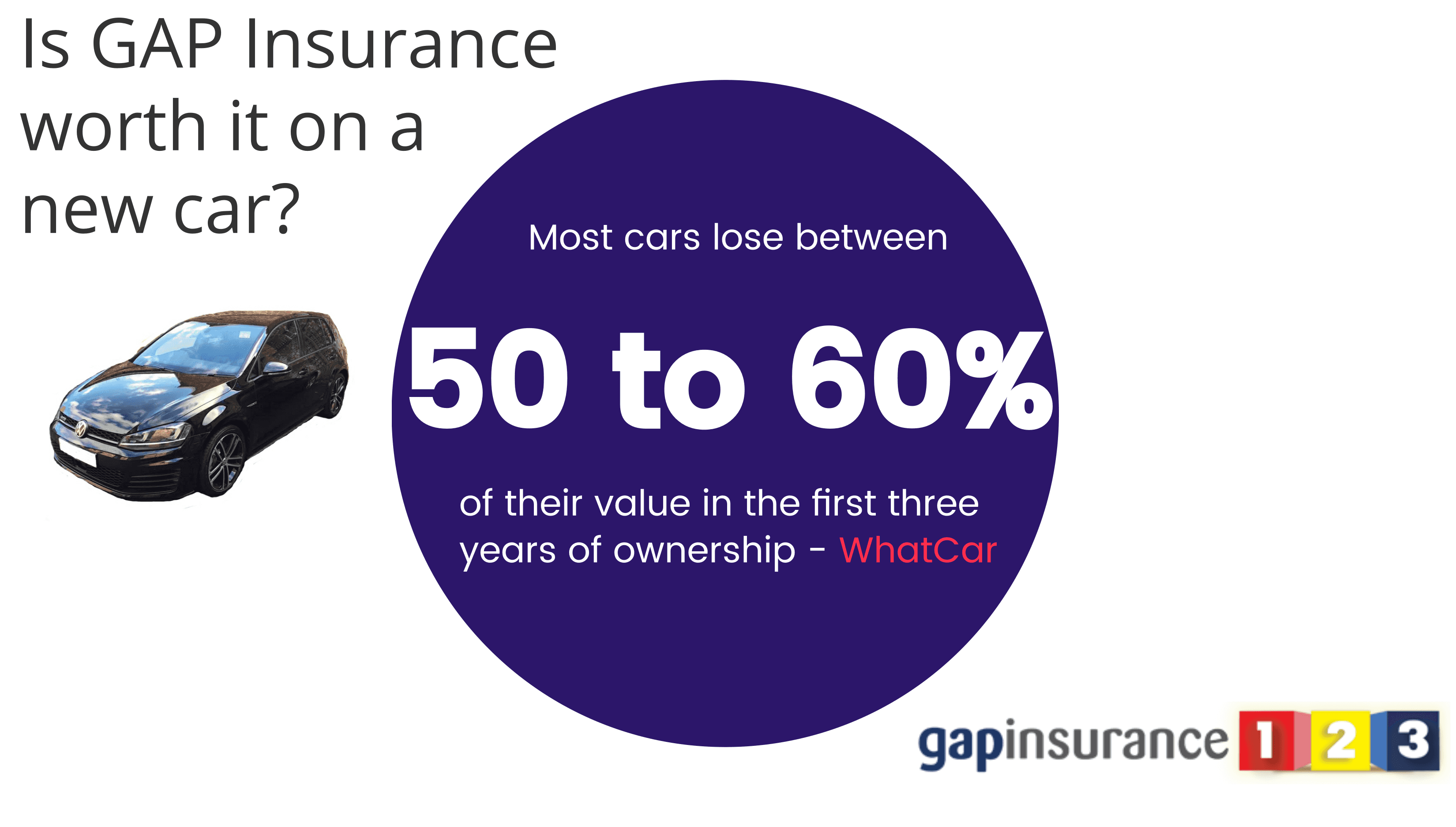
Many motor insurers will offer a new vehicle replacement should the vehicle be deemed a 'total loss' by them in your first period of ownership (commonly the first year). This means that instead of only paying you the market value then they will actually provide you with a replacement new vehicle instead.
Back to Menu
Maybe not, on the face of it, but there some things to consider. If you want Gap Insurance to cover you after the first year is up then it may not be as simple as coming back in 12 months time to get your cover in place. This is because many Gap Insurance providers limit the period allowed between purchasing the vehicle and purchasing the Gap Insurance policy. Typically this can be 180 days. So if you left buying Gap Insurance for a year then you may not have many providers who could offer you one of the best levels of cover. Even those who may be able to offer you a Gap policy you may find that the premium is higher than it would have been if you had bought Gap Insurance at the time you bought the car.
So if you already have effectively Gap Insurance in the first year but you also want the option to cover you for later years then what is the answer? You can, in many cases, defer your Gap Insurance for the first year. This means you buy the Gap Insurance.
Back to Menu
The two factors behind the decision to get Gap Insurance on a new car can be simplified as a new car nearly always depreciates at a quicker rate (certainly initially) that a used vehicle and you normally pay far more for a new vehicle than you would for a used example of the same model. So more depreciation and at a quicker rate means that a financial shortfall can occur. This is well worth the consideration of protection in many cases.
A used vehicle will also suffer from depreciation but as it was cheaper in the first place then you would hope that the steepest depreciation has already happened. There is possibly a better argument for GAP Insurance on a new vehicle but if you are concerned about any financial loss if the vehicle is written off then cover can be useful for new or used.
Back to Menu
I am sure those of you who have researched Gap Insurance will have found a range of views from those on internet forums and such like. Many see Gap Insurance as 'money for old rope' as the chances of a car being written off is relatively low. There may be an argument for this but for those who have been in that situation, and have had to use their Gap Insurance then we suspect the view point may be very different.
It is an accepted fact that the rate at which vehicles are written off each year, and therefore the rate at which a Gap Insurance policy can be claimed on, is relatively low. Various sources seem to indicate that somewhere around 500,000 vehicles are written off each year. Sounds a large number but when you realise that there is north of 30 million vehicles on the UK roads then this is put into perspective.
So low claim rate - accepted.
When buying a vehicle another fact must almost always be accepted............the vehicle will lose value during the period of your ownership.
If you look at a brand new vehicle then some may only be worth 30% of the original value in three years time. Some may fair better than that but it is not unusual to expect a new car to have lost at least 50% of its original value in the first three years.
The third factor to consider is that if the vehicle is written off (that is the motor insurer deems the vehicle beyond repair following an accident, theft, flood etc) then the amount your motor insurance will pay is normally only the market value of the vehicle at the time of the incident. This is NOT the price you originally paid for the vehicle, nor is it guaranteed to be enough to pay off any outstanding finance or give you enough to effectively start again with the same age and mileage example as yours was on the day your bought it.
Gap Insurance can help you bridge the losses described above. 
Back to Menu
A really good question, and the answer depends on a number of factors.
The price of the vehicle - the more expensive a vehicle is to start with, the more depreciation it can suffer and therefore the risk of a higher payout is there for the Gap Insurance policy.
The length of cover required - again the longer you want a Gap Insurance policy for the bigger the depreciation will be on the vehicle, the bigger the risk to the Gap Insurance policy.
Where you are buying the policy from - given that the rate of insurance premium tax is higher, when you buy Gap Insurance from your motor dealer instead of through an indepedent provider like GapInsurance123, plus the commision structures are often quite different also, it can normally be the case that Gap Insurance through motor dealers is far more expensive than it is when purchased through indepedent providers.
Other factors can include the type of Gap Insurance you require. For example, if you buy a Vehicle Replacement Gap and compare the price of it to a Finance Gap then you should see that it is more expensive. This is because on a 'like for like' basis a Vehicle Replacement Gap will provide a higher settlement than a Finance Gap polic in nearly every instance.
Back to Menu
Q : Is Gap Insurance transferable?
Generally Gap Insurance can be transferred from the policyholders old vehicle to the policyholders new vehicle, subject to the terms and conditions of the policy being met. This cirumstance normally occurs when you part exchange you old vehicle, that has Gap Insurance cover, for a new vehicle.
You should check the policy terms and conditions however, as not all policies will have the option to transfer within them.
Circumstances where you cannot transfer the Gap Insurance may include:
Back to Menu
Q : Are all drivers covered by the Gap Insurance policy?
In general, the main motor insurance policyholder plus all 'named' drivers would be covered by the Gap Insurance policy you purchase. This would include any driver you add at a later date than the purchase of the Gap policy also. The drivers must be fully comprehensively insured at all times and all other policy terms must be met. For example, some Gap Insurance policies require all drivers to be over 18, or have a full driving license.
Again you should check the individual policy terms of your Gap Insurance policy to ensure that the general terms we normally see do apply in your case.
Back to Menu
Q : Who actually covers you with the Gap Insurance policy?
When you buy a Gap Insurance policy there are often three separate companies involved with that policy. They will be
As you may suspect it is the insurer who is the most important company in the process. If the retailer, or even the claims administrator ceases to trade then your policy remains live and in place.
Back to Menu
Q: Am I covered if the Gap Insurance underwiter goes bust?
If the retailer is a UK based company then you should have automatic protection under the Financial Services Compensation Scheme should the insurer fail or go bust. This means that you could be covered for up to 90% of your claim if the insurer cannot meets its obligations to you.